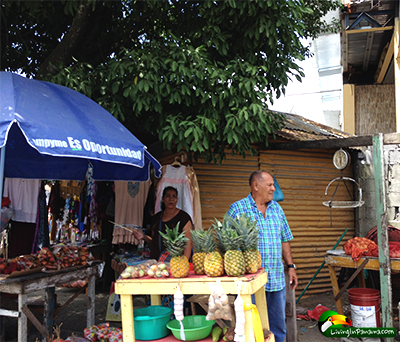
I am writing this in late March, the peak of the dry season, and the temperature can get pretty hot in these months (today there is a wonderful breeze blowing off the ocean, so it is not too hot). Since our house is not air conditioned, I sometimes find myself driving my wife’s air conditioned car to Romero’s supermarket (also air conditioned), possibly buying a local paper, and reading it at a leisurely pace, while I sip a Cappuccino (50 cents) in air conditioned bliss. When I am finished reading and sipping, I slowly wander through the aisles to choose my groceries in this comfortable, modern supermarket, before heading home to the family.
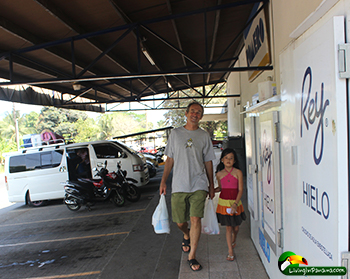
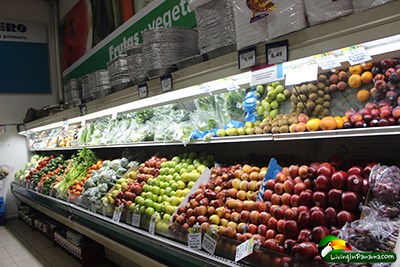
I know that I am paying more for groceries, particularly fresh produce at Romero’s than I would from one of the street vendors. Plus, the quality is not as good as it would be from the small street stalls, or pickup truck vendors who buy their produce directly from the farmers. They don’t take the produce to a central distribution center, as Romero’s does, before bringing it to Puerto Armuelles.
I have come to realize that, during the cooler, “rainy season” I go to Romero’s far less frequently. (FYI the rainy season is from mid-April to mid-December.) Most days in the rainy season, I ride my bike to run errands around town. Then, I avoid the modern supermarket. My family tends to eat more healthfully, and our grocery bills are much lower.
But this article is not about our Rainy Season-Dry Season climate here in Panama. It is about how you can save about 50% on your grocery bill, as well as eating a much healthier diet, if you buy your produce from the street vendor rather than going to Romeros or another
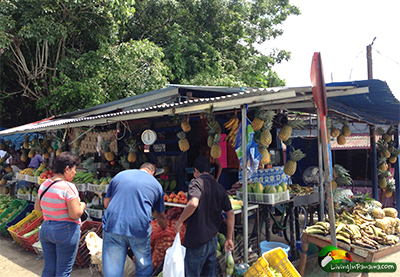
Supermaercado.
(If you do want to know about the weather in Panama, Betsy wrote about it here.)
The best days to shop are on dias los jubilados, which is when retired folks all over Panama line up to receive their semi-monthly social security check. On those days the number of vendors and the variety of items for sale skyrocket.
Find out about Chiriqui's Organic Farm, Finca Santa Marta. They deliver organic produce to you here in Puerto Armuelles and throughout Panama. The info is under Tip #2, Eat Healthfully & Locally.
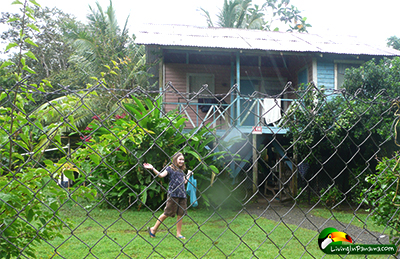
In addition to great value on super fresh produce, you can also save a bundle by purchasing fresh-caught fish from local fish buyers in Puerto.
There are several neighborhoods where a local wholesale fish buyer buys from the fishermen and will sell to you at very reasonable prices.
For example, you can always find fresh:
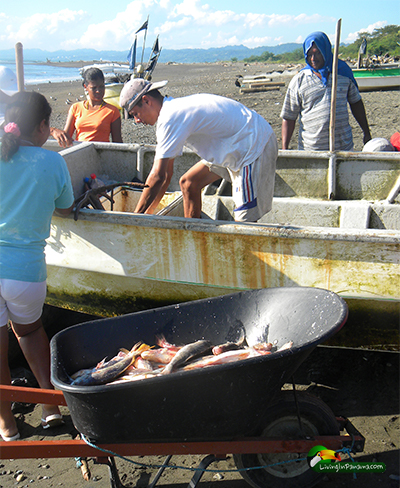
I suppose that you could try to buy directly from the fishing boat, but I have a feeling that this would not go over well with the fish buyer. Generally, all fish in the neighborhood fishing fleet are sold to one or two buyers. They get a consistent product, and they provide a consistent market for the fishermen.
Of course you also run into people trying to sell you seafood out of a bag - with no ice - I always say no to that.
Watch a video of buying fish fresh off the boat in Puerto Armuelles.
You can also buy both beef and pork from local ranchers, and save a bundle. You might have to buy an entire side, or quarter of a steer, or pig, but if you ask around, you can usually find some one to go in on the purchase. But to do that successfully, you will need to purchase a dedicated freezer to store your meat.
One neighbor of ours frequently raises a pig for his family’s own personal use. He has also built a smoker, so that he can custom smoke his own bacon, and he stuffs his own, custom smoked and seasoned pork sausage. Neighbors and friends who get on his “list” early can enjoy the same great quality pork products.
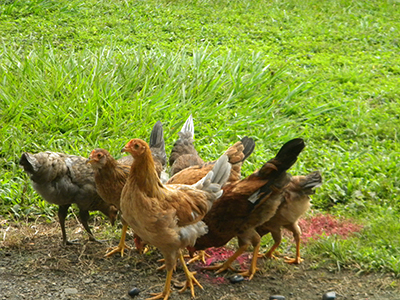
I was surprised to find that free range chickens (gallina de patio) tend to cost much more than commercially raised chickens. While a whole chicken at Romero’s, if you can find one, might cost $6 or $7, a family raised, free range bird might run as much as $13, o$14. Once I discovered just what effort it takes to raise a chicken, successfully, to adulthood, in and around one’s own yard, I understood.
As a side note, this short video below shows the challenges we had raising gallinas de patio. Of course, our daughter would never even think of us eating her chicken friends.
[leadplayer_vid id="5724C858929BD"]
The free range birds, are truly free range, and these will be the same birds that you have seen running around near the street (or in the street--- so drive carefully; “You killed it, you bought it”, as the saying goes.) When people have gallina de Patio to sell they will sometime announce that fact by posting a sign saying simply, Gallina de Patio. Ask around and you can find out who usually sells them.
Important Cooking Tip For Gallina de Patio
If you decide to buy one, you cannot cook it like you would a "regular"chicken. These birds are tough. Gallinas de Patio eats mostly bugs, and table scraps, and do not usually eat any commercial (read, hormone-fortified) feed. Thus they eat a lot more protein, very little grain, and no chemicals. They grow more slowly and get a lot more exercise than their caged counterparts. In short, these birds live a life that is a lot closer to that which a wild fowl might live. As a result, these chickens are leaner (stringier and tougher) and have a stronger, “gamier” flavor.
The first time our family tried one of these birds, we put it on the grill and basted it in barbeque sauce. We just assumed that a really “special” chicken should be cooked on the grill and enjoyed all by itself, so that the flavor could be experienced.
We were wrong.
It was like chewing on a moccasin. The free range gallina de patio is better slow cooked, in a stew pot, so that the meat has time to become tender, and so that all the rich flavor of the meat can infuse the entire stew. If you try this, you will quickly discover the superior flavor of the gallina de patio. It is a delicacy. This is what chicken used to taste like, before all the gallinas de patio were rounded up and packed 7 per cage in the mega “chicken farm”.
How to cook a Gallinas de Patio - for Sancocho, of course.
When you move to Panama, you find that you have a lot more free time on your hands. One satisfying way to spend part of your day is to shop for, and prepare the best quality food available. You will find that you can lose weight, improve your overall health, and save a bundle on your grocery bill at the same time by taking advantage of buying directly from small local producers and vendors.
Learn 4 essential tips for healthy living in Panama.
March 26, 2016 by Skylar Vayda and Betsy Czark
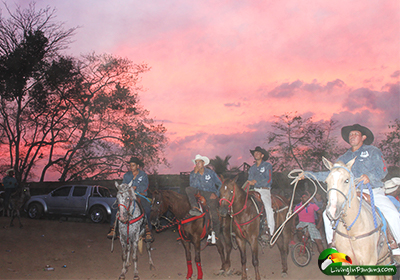
The Rodeo, or Pista de Lasso (as it is called in Panama) consists of lasso teams competing to lasso a calf in the shortest time possible. And definitely under 20 seconds, which is the maximum amount of time a cowboy has to lasso a calf within an 80 meter long space.
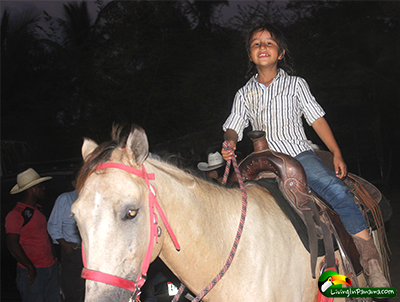
The rodeo begins at 11 am and goes into the evening. Because of this time frame, as the day progresses, some teams perform more poorly than others because one or more of their riders is drunk.
The rodeo's atmosphere is lively and at time intense, as the supporters of each team shout their encouragements. There is also a fair amount of unofficial bets being placed, so that may be something to look out for.
My (Skylar's) past experiences at the rodeo have been wonderful. I loved horses when I was younger. Because of that I especially enjoyed seeing the pure breed horses outfitted in their colorful harnesses. I went often when I was younger. I even owned my own lasso so I could practice. But I watched much more lassoing than I practiced.
The rodeo season is a large part of the culture in Panama. While in Panama you should definitely experience it at least once.
Puerto's Rodeo Schedule
Rodeos occur on 8 consecutive Sundays. The first rodeo was on March 6th.
The Pista de Lasso technically start at 10am, but usually don't get going until 11ish. Food and drinks are sold at the events.
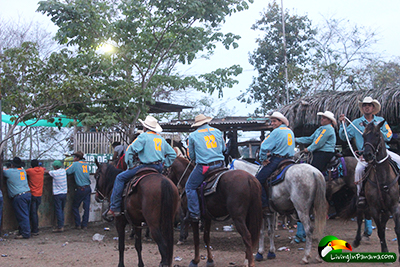
5 Remaining Competitions
March 27 - Location outside of Puerto Armuelles
April 3rd - Casa de Puma - located about 3 miles from downtown Puerto
April 10th - Location outside of Puerto Armuelles
April 17th - Romero Arena in Altos San Vicente neighborhood
April 24 - Location outside of Puerto Armuelles
There are a total of 10 teams competing in these rodeos. Four are from Puerto Armuelles. One of those teams is sponsored by 2 Puerto Armuelles expats & horse lovers: Veronica and Tony.
Do you want to be part of a team? You cannot just join, you must be invited. The teams are really clubs. To show your interest and prowess, you must go to the practice roping events that are held from November - February.
I will be updating this post soon. I want to impart the wealth of information about these events from Veronica and Tony.
I simply don’t have time to write it up now. But I wanted to get the rodeo schedule to folks in case they want to attend. Last Sunday, Skylar and I enjoyed ourselves at the rodeo in Altos San Vicente. The photos on this page are from that day.
Update: During Panama's coronavirus quarantine, no one is allowed to leave their house on Sundays, including Easter Sunday. Easter 2020 will be very different throughout the world. For those missing community this day, reach out to family and services online. My family is doing a group zoom call on Easter. Your church is likely conducting services online. A Google search will uncover more services and ways to connect. Keep healthy!
It is one of the most popular and celebrated holidays in Panama.
Semana Santa starts on Palm Sunday and ends 7 days later on Easter/Pascua Sunday.
During the weekdays of Semana Santa, the celebrations are noticeable solemn and religious in nature.
But on Holy Saturday and Easter Sunday, only the more religious remain solemn.
For the majority of people, all solemnity is shed on Saturday, esp. Saturday night, and on Sunday.
Come the weekend, spending the day at the beach, clubbing and drinking become the more popular activities. Of course, the powers that be encourage solemnity by banning alcohol sales from Thursday thru Saturday. (For more on alcohol & other bans, read further down.)
Easter is also the last holiday for 6 months in Panama. This could explain why the week-long holiday ends more in a party mode rather than in a solemn religious fervor.
The next holiday is in November. To make up for that 6-month long hiatus, the month of November celebrates 5 holidays.
Semana Santa also often marks the end of summer or the dry season. The rainy season usually begins in late April or in May.
Discover more about Panama's climate and weather.
As I've indicated, Holy Week is a time for special masses, local religious processions dedicated to Mary, Jesus, a Saint, Jesus's last supper, crucifixion, or resurrection.
Every day of the week commemorates different things. I describe the most significant days below.
Palm Sunday - Celebrates Jesus’s return to Jerusalem after his 40-day fast in the desert. His followers laid down palm leaves before him to walk upon.
You won't see that. But you are likely to see people walking around with palms or palms woven into crosses after they leave the church on Palm Sunday.
Holy Wednesday - Church services typically include the reciting of the stations of the cross. Some churches put on a Passion of Christ play (aka Easter Pageant) to dramatically depict the stations of the cross. (Passion in this context means suffering).
The Stations of the Cross: There are 14 stations which represent various milestones of Jesus's last week of life (Holy Week). The first is of Jesus being sentenced to death by Pontius Pilate and the last is of Jesus being laid in his rock-hewn tomb.
Maundy Thursday - Commemorates Jesus's Last Supper and the command he conveyed to his disciples during the meal:
"A new commandment I give to you, that you love one another: just as I have loved you, you also are to love one another" (John 13:34).
For me, this command to love one another is the most important and essential element of Semana Santa.
Some churches have silent processions on this day while others hold reenactments of Jesus's journey carrying the cross. (Note: Maundy is a shortened form of the Latin word mandatum, which means command.)
Good Friday - Commemorates the crucifixion of Jesus Christ. All across Panama, you will find somber and religious processions to commemorate this event.
Some processions have floats, some visit the stations of the cross that parishioners have constructed in various locations on the procession circuit, and some do both.
Whether you are a believer, a photographer, or simply curious, you will find a Good Friday procession in almost every Panamanian town.
Below are photos of people gathering for the Good Friday procession to visit each of the stations of the cross which were created in various neighborhoods.
These photos were taken in Puerto Armuelles, Panama. The photos of the stations of the cross were taken in the day, before the procession. Click on any photo to start the slide show.
Holy Saturday - This is a day in which Jesus was is in his tomb. There is not much to reenact or do with around that. However, as the photo shows, not everyone goes to the beach.
Easter/Pascua Sunday - Big celebration of the resurrection of Christ. The day he rose from the dead. In the States, that is the big day for believers to attend church.
On Easter day in Panama, mass is held, of course. However, in Panama, believers are more likely to attend church multiple times earlier in the week.
The date of Easter changes each year. It can occur anytime from February through April. The exact dates vary in accordance with the lunar calendar.
The following are prohibited from noon on Maundy Thursday thru 6pm on Holy Saturday:
If you want to have a drink during those 54 dry hours, you should purchase your alcoholic beverages before noon on Maundy Thursday.
Like all big holidays in Panama, people pour out of Panama City to go back “home” and then they flood back again. If you can avoid it, do not travel from Panama City into the interior on Wednesday or Thursday or in the reverse direction on Sunday.
Keep in mind, during Easter, Carnival and other big exodus holidays, the government tends to turn the Pan-American highway by Panama City into a reversible lane highway. Which means, trafffic will only be allowed to exit Panama City at the beginning of the holiday. Then when everyone heads back to the city to go to work, the section of the highway near Panama City will only allow city-bound traffic. Check the news before you travel.
Everyone gets a four-day weekend. There are 3 public holidays during Holy Week: Maundy Thursday, Good Friday, and Holy Saturday. Most people also get a half day off on Holy Wednesday too. Mostly, because nobody's mind is on the job before this big family holiday so their employers just send them home.
You will find all government offices and many establishments closed during this 4 to 5 day weekend.
There are a number of foods that are special for the week of Semana Santa.
This article is long enough, so I write about Panama's Easter foods in a different post.
In the last few years, you can find easter decorations and related items in Panama.
But it is not prevalent or even found in all places in Panama. If you are searching for something as specialized as a chocolate Easter bunny, your best options will be found in Panama City or in places where there are a number of expats.
If you want to participate in an egg hunt, your best option may be to host one yourself.
My kids grew up in Panama, creating a more American-like Easter is a challenge. When we first came, I could not even find food coloring to use to dye our eggs. Turned out it was fun to discover our own dyes. We love dying eggs in my family.
To find out what we do, see my article on how on expat kids celebrate Easter in Panama.
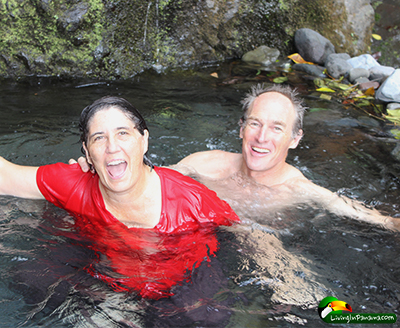
You can see us playing in the river (Rio Macho de Monte) as it runs through the canyon.
The trip reminded me how small and easy it is to explore Panama, and Chiriqui Province in particular.
Business & Pleasure
We wanted to go play in this cool mountain river (see photos), but we also had to meet with a lawyer in David. So we combined the trip.
Day Trip
Home - Beach - City - Mountains - Home again
After Reyn and I returned from our morning surf/boogie board at the beach, all four of us piled in the car. We left Puerto Armuelles at around 10am. We drove to David to meet with the lawyer.
Then we decided to drive past the canon turn off, and go all the up to Volcan to eat lunch. We like the food at Restaurante Mana at the Volcan Lodge. A 15 mile round-trip detour.
After filling our bellies, we went back down to the little village of Cuesta de Piedra, where you turn off to go to Canon Macho de Monte. (I describe how to get there at the bottom of this page and I show what it is like there in photos below.)
We had a delightful and leisurely time playing in the water and boulder hopping. Then we headed back to Puerto Armuelles. We got home before dark (It gets dark around 7pm these days). A very eventful, fun, and even productive day trip.
I had been wanting to check out this canyon for awhile. From the road it is a short walk to the canyon bottom. The trickiest part is that a huge hill of sandy gravel shares the path down, so it is a bit slippery.
In the slow part of the river there were tadpoles that my kids enjoyed catching. A pool to dunk yourself in. Boulders to hop to get to the fissure where the water runs faster and cascades down even further. People have secured a rope right there so you can play in the rapidly tumbling water, but I loved dunking myself in the cold water. Now that I have gone, I want to come back in the rainy season.
The photos below were taken towards the end of the dry season (mid-March). I look forward to going back in the rainy season. I am sure the water flow is much more dramatic and exhilarating.
Take the road up to Volcan. You turn off the InterAmericana onto the Volcan road at the town of Bugaba. There is a sign marking it on the InterAmericana. The turn off for the Canon is at the tiny village of Cuesta Piedra, about 7.5 miles or 12 kilometers south of Volcan.
If you are heading north (or uphill) towards Volcan, there is a sign marking the turn for Canon Macho de Monte in Cuesta Piedra. No such luck if you are heading down from Volcan. The turn is at an intersection with a gas station (photo below) and a few other commercial buildings. You can only turn one way. There is no road going the other direction.
I have put photos below of some key places to look for so you know where to turn, park, and walk.
You will drive on that road for less than 3 kilometers. Look for the guard house for the hydroelectric plant. It will be on your right, as you head down a hill. As you down that hill you will see a ruin of a building on your left (see photo below). Park there. Then walk down the road and take the trail (see photo) just before you cross the bridge over Rio Macho de Monte. As I've said, the trickiest part of the short walk to the canyon bottom is that a huge hill of sandy gravel shares the path down. It is a bit slippery. It is a short walk.
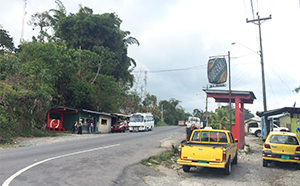
Reyn describes day trips from Puerto Armuelles in a past post. He talks about going for hikes in Cerro Punta.
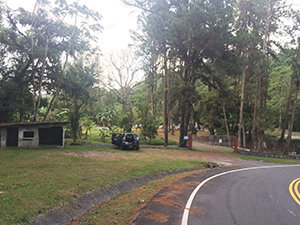
Maybe because it was so very hot for the first couple of hours this year. But I think the bigger factor was the line up.
[leadplayer_vid id="56D5CE2BC92FA"]
Last year, on Sunday, there more blues performers and the performers were much higher energy. The crowd was higher energy. More people were wearing mardi-gras beads and crazy hats.
Of course, we were also missing Lil Ed and the Blue Imperials. Lil Ed brings his own very enthusiastic head-dress-wearing crowd. But there seemed to be more acts too.
(You can see photos of the 2015 Boquete Jazz & Blues festival here.)
Also missing was face painting and homemade gelato ice cream.
However, there was fabulous pizza baked in a portable wood-fired oven. The ice cream was good, but it wasn't as good as last year's. I loved this year's misters that lightly spayed water on you. They didn't have those last year, that I remember. Did I mention it was so very hot this year.
I enjoyed Tommy Castro very much. He is more R&B than Blues, but his is undoubtedly good. But Sunday's performers weren't the same level of energy and diversity of performers as last year.
Next year, I am will check out the line up more before shelling out the money. I go for the blues, not the jazz. So a good blues line up is critical for me.
Next year's festival will be from February 9 - 12, 2017.
So far the line up looks promising
According to the Boquete Jazz and Blues website, this is the line up.
Regular priced tickets go on sale on April 1, 2016.
I wish they would dedicate Sunday to Blues and Saturday to Jazz. I would sign up for next year right now, if I knew I could be listening to almost all Blues on the day I chose.
For a short time, 2017 Boquete Jazz & Blues Festival tickets are for sale online at a discount. But again, only for a short window of time.
From February 28th 2016, at 6pm until March 2, 2016 at midnight!
The discounted price is $117, which gets you admission for both Saturday and Sunday. Unfortunately, this early out you cannot buy a ticket for Sat or Sunday. You must buy it for both.
To give you an idea of the savings. One day tickets for 2016 were $74. I think the 2 day tickets were $169.
I am not sure if I will buy them early or not. I would have to commit to going for both days. Which could be fun, but I think I would have to leave my kids at home. I don't think they would go for it, at least not happily.
Did you go this year? What did you think?
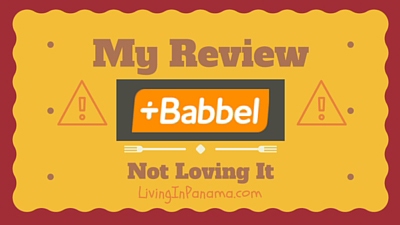
The good thing about Babbel is that it works hard to make sure you really learn the vocabulary in each lesson.
It focuses on 7 or 8 new words in each lesson. You hear, say, read, and spell each of those words. Multiple times in multiple ways.
However, I really did not enjoy Babbel.
I took lessons in 2 different Spanish courses: Shopping and Music.
Each lesson has a certain number of steps you need to take to complete it. While you can skip any one screen, you cannot skip around, and you never see a lesson overview.
I felt trapped in the lessons.
It was not dynamic, interactive (in the way I like) or engaging. It felt much more like learning from a book. I was almost immediately dismayed and bored.
Here are what the lessons look like. Click on any to see it larger.
Also, I never got the sense of where the lessons were taking me. Did I really need to know the words they were choosing to teach me?
I did learn how to read and write some words in both categories. But I wasn't learning how to construct sentences. It was unsatisfying.
Also, after using Rocket Language's excellent speaking component, I was very frustrated with Babbel's.
The microphone image in the 1st image above, is your opportunity to speak Spanish. Unfortunately, the method neither works well or is effective.
Babbel's voice-recognition system has issues.
The microphone turns into a green check when you say the word correctly. Or at least when the computer thinks you did. But you never hear the recording yourself. So you never know how you actually said the word.
I found Babbel's voice system of zero value, except as a way for me to practice patience.
It made me value Rocket Language's voice system even more. Rocket Language's excellent pronunciation feedback loop has been invaluable to me.
You can see my Spanish Rocket Language review here.
Check out the screenshots below to see the various Spanish courses that Babbel offers. When you sign up you can choose to do any or all of them. (click on images below to make larger)
You can check out the first lesson in each course for free. And you can do that for any of Babbel's 14 languages. You don't have to limit yourself to Spanish.
The price ranges from $7 - $13 a month. The longer you sign up for, the cheaper it is. $7 a month for 12 months, and $13 for one month.
If you buy the course, you have 20 days to get a full refund.
Yet another reason I like Rocket Language. You pay once, and you get a lifetime membership. Of course, you do have to pay more. But less than a year's membership with Babbel.
Once I review a few more Spanish programs, I will have to do a comparison of them.
If you only need to read or write Spanish, then Babbel could be a good choice for you.
You would have to check it out yourself at this link.
I am still very much liking Rocket Language (as you can tell by my comments).
To check out Rocket Language for free, go to their site here.
[leadplayer_vid id="56CDB580216A9"]
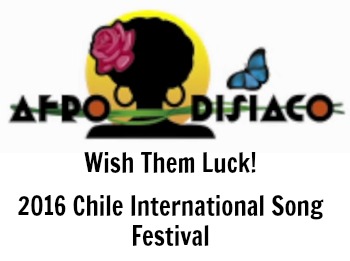
On Monday, February 22, the Panama band, Afrodisiaco, is competing in a 2016 International Song Festival. They will be performing their song, Coming from Panama (Viene de Panamá )
Led by Miroslava Herrera and Tatiana Rios, they will compete in the folklore category, along with
Comes From Panama was selected from more than 500 songs to participate in the competition folkloric Viña del Mar International Song Festival 2016.
Comes From Panama is a new song with the atravesao drum beat from the Azuero region of Panama. The drum has its origin in Africa. It was brought to Panama during the 16th century when there was slave trade from Angola, Cameroon, Guinea, Congo and other territories. European influences that are rooted in the region such as the violin, mejoranera (inspired guitar) are incorporated.
The band members say they chose Aphrodisiac as their name because it evokes the desire for freedom of the black slave in America, says Herrera.
Among long-term goals, the group to record songs representative of the origins of black drum provinces of Colon, Darien and the Azuero region.
I very much enjoyed their song. I hope they do well in the competition.
Viva Panama!
Sources:
PanamaNewsroom.com
Youtube video description of video above
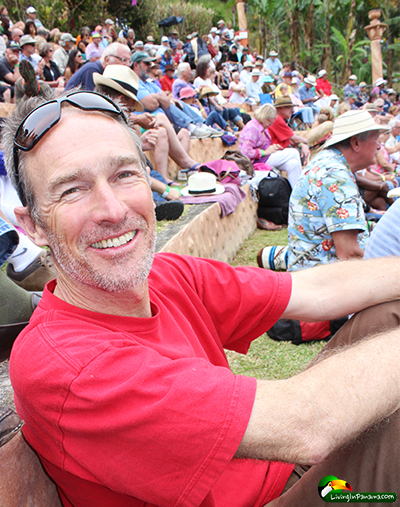
Last year, my 8 year old was NOT thrilled. My 13 year old enjoyed it. My husband (the guy in the photo) liked it alot. And I loved it!
I had the best time dancing to amazing blues music.
Read about our experience at last year's Boquete Jazz & Blues Festival.
It is less than 2 weeks away!
Here's a video preview of this year's Festival
[leadplayer_vid id="56BFAC747B5ED"]
While the event is fabulous, the festival's website (here) is terrible. It is hard to find information on it.
I couldn't find links to their most important pages, like the festival line up page and ticket purchase page. But I persevered and uncovered those links eventually. I'll put them below.
On Thursday, Feb 25th at noon, the Festival kicks off with a New Orleans style street parade followed by a free concert at the town's central park.
The Festival really kicks into gear on Saturday and Sunday.
Here is the schedule and line up. For updates to the line up and program, visit the Festival's program page here. Acts are added often, especially on the 1st 2 days of the Festival.
If you don't book ahead, it can be hard to get a hotel room in Boquete. Last year, we went on Sunday and then stayed at Ciudad de David hotel (in David) that night. (FYI - David is 30 minutes from Boquete. Puerto Armuelles, our town, is 1 hour and 15 minutes from David.)
We are going to do something similar this year. We could drive home directly from Boquete, but it makes it more of an event if we stay the night. Plus we usually have something we can accomplish in David.
Also, its a good idea to buy your tickets ahead of time. They sell out.
To find out more about your ticket options and costs go to their website here.
To buy them online use this link here.
As you can see, the tickets aren't cheap. For me its a bonus that kids 12 and under are free.
The festival has a facebook page where they share videos and updates.
While I didn't find the official website super helpful, this site has lots of great information about the festival and related info. You might want to check it out.
If you are coming from another country or from Panama City, there are some good things to know about.
Festival goers can get a 15% discount on Copa airlines flights to either Panama City or to David. It is only for economy seats from February 20th - March 4th, 2016. Book your flight on Copa here. Use coupon code C6705.
This is especially good because Copa is now offering connecting flights from Panama City’s Tocumen airport to David's Enrique Malek Airport. International travelers used to have take a taxi from Tocumen to the Albrook airport to catch a flight from Panama City to David.
This development is wonderful, and so much cheaper for travelers. Used to be, if you flew into Panama City and wanted to catch a flight to David, given schedules and time needed to get to Albrook, you often had to spend the night in Panama City. So you had to pay for more taxis and a hotel room, etc. Even if you could catch a flight that day, you had the cost of the taxi ride to Albrook.
With Copa's flight to David you get to skip the taxi ride to Albrook and you are much more likely to be able to catch a connecting flight that day. Plus Copa's flight to David is cheaper than Air Panama's out of Albrook airport.
We love Copa! It is our family's favorite airline.
Technically, you can only fly from Tocumen to David's airport if you are connecting from an international flight. However, I have taken that flight without having arrived on an international flight. But I wouldn't count on being able to do that.
Not flying internationally? Take Air Panama's flight out of Panama City's Albrook airport to David's Airport. There is no festival discount available for that flight.
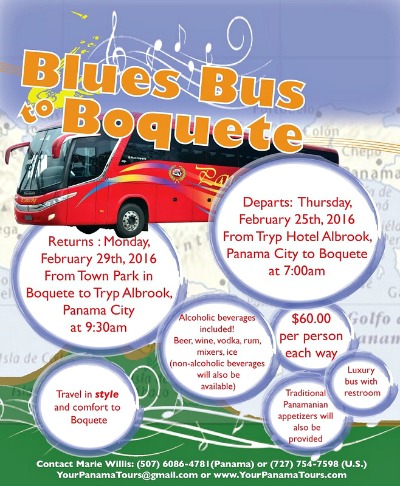
You can also take a bus from Panama City with other festival goers.
The details are on the flyer for the Blues Bus to Boquete.
I smile just thinking about going. It is my birthday gift to myself.
Maybe I'll see you there. Please come and say "hi" if you see us.
We will be the only family with both a young Chinese daughter and a blondish teenage daughter.
I'll most likely be dancing in front of the stage. 🙂
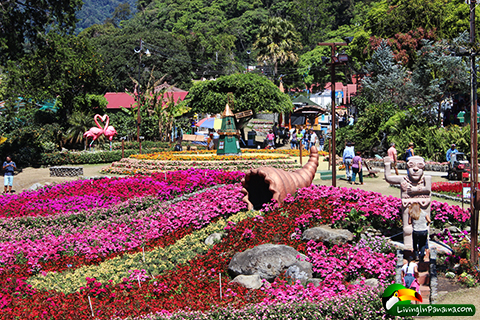
The landscape and garden design are certainly beautiful, but are by no means the best out there.
During the afternoon hours, the festival ground are relatively vacant.
In Panama, crowds only begin to filter in around early evening. In order to attain the lively festival experience you may need to sacrifice a good night's sleep in order to drive home, or money on a hotel room. During the evening & night, the festival adds amusement rides, live music and dancing to the mix.
Scroll down to see photos of the festival & Boquete
Of course if you don't mind a slower paced festival escapade or the hot sun, a one day trip to this festival is perfect.
Since this event was originally a coffee fair, it still offers up a large variety of local coffee brands. Boquete is known for having some of the best coffee in the world, so if you enjoy a good roast you should give this event a visit.
The festival is surprisingly small, especially for an event that has been held for over fifty years. Venders occupy most of the fair grounds, selling flowers, coffee, and traditional hand crafted souvenirs.
Though many people come for the coffee and flower arrangements, to me the real star of this event is the town and the scenery surrounding it.
During the 10-day festival there is an explosion of venders outside the festival grounds as well as inside. While in town you you might like to visit the plethora of restaurants, ice cream shops, as well tour coffee farms.
So if you come to Boquete solely for the festival don't forget to stay a little while, look at the views, and grab a bag of local coffee beans for the road.
The festival is the attraction, but in order to get the full experience you have to appreciate the town that puts it on, Boquete.
If you want to learn more, my Mom, Betsy, wrote some about the history of the Boquete Flower & Coffee festival.
This article was written by my 14 year old daughter, Skylar Vayda. Over the next 3 months, Skylar will be writing a Panama-related article each week. She will be picking the topic. We hope you enjoy them.